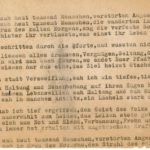Untitled poem written in Theresienstadt ghetto
Author Unknown *
Today, I saw a thousand people with distraught expressions
Today, I saw a thousand people walking towards nothingness
In the grey of the cold morning, wandered the ostracized crowd
Leaving everything behind which they once called their life.
They walked through the gate
And left all the joy, happiness, prestige outside.
Where will this lead, where will it end?
They only know they will end up behind barbwire.
But then instead of despair, I saw a hidden glow,
Also their posture and control while walking seemed to grow.
I saw their will to live, I saw their courage
I even saw a little smile in some of their faces.
And suddenly I comprehended the ghost of our people.
Destined to suffer, though the suffering was always put aside,
A people that experienced distress and misery, banishment and custody
but always maintained an unbroken strength.
Today, I saw a thousand with distraught expressions
And I saw in the grey of the morning, a ray of the eternal light.
–
* Though the author is unknown, this poem is often attributed to Margot Friedlaender. It seems that even if Friedlaender did not write it, she typed it out while in Theresienstadt and kept it with her.
This poem was typed on an official Nazi form from the ghetto. It now resides in the Leo Baeck Institute archives.
Margot Friedlaender née Bendheim was born in Berlin in 1921. While working for the Kulturbund, she met her future husband, Adolf Friedlaender. In 1943, she went into hiding, after her mother and brother were arrested and deported to Auschwitz. After hiding for a year and three months, she was betrayed and deported to Theresienstadt, where she was reunited with Adolf Friedlaender. After their liberation, they married. They lived a year in the DP Camp Deggendorf before arriving in New York in 1946.
Only recently did Margot Friedlaender return to Theresienstadt, a bit before her 90th birthday. You can read about her visit to the former ghetto here (in German).
Translated by Meike Bingemann and submitted by Michael Simonson, Leo Baeck Institute.

